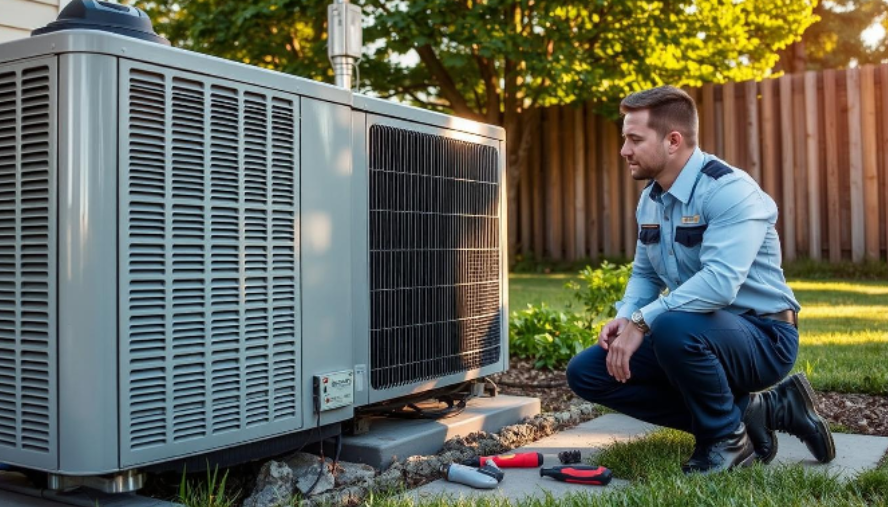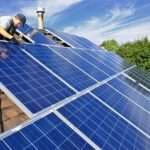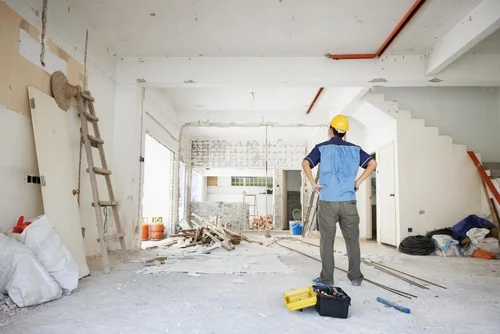Ever hear a strange hum or rattle from your cooling system? You’re not alone. Many Jacksonville homeowners notice odd sounds during routine HVAC operation. But figuring out what’s normal versus a red flag can feel confusing. Let’s simplify it.
Minor AC Noises
Most units make some noise – like gentle airflow or occasional clicks during startup. Problems arise when you hear grinding, screeching, or persistent banging. These often signal issues like loose components, refrigerant leaks, or motor strain. Early detection saves money and prevents breakdowns during Florida’s sweltering summers.
We’ll help you identify common sounds using real-life examples from local residents. You’ll learn quick fixes for simple problems and when to call a pro. Knowledge is power – it keeps your home comfortable year-round.
Key Takeaways
- Distinguish between harmless operational sounds and urgent repair needs
- Discover DIY solutions for loose parts or debris-related noises
- Recognize when professional HVAC troubleshooting becomes essential
- Learn maintenance tips to prevent recurring AC sound issues
- Understand how climate impacts system performance in coastal areas
Minor AC Noises
Your air conditioner isn’t meant to be completely silent. But knowing which sounds are normal can save you time and stress. Like a refrigerator’s hum or a ceiling fan’s whir, many AC noises are just part of everyday operation. Let’s look at what’s harmless, what’s fixable, and when you might need professional help.
Air conditioner noise diagnostics
What Constitutes a Minor AC Noise?
Minor noises usually have three things in common:
- Consistency: Happens predictably when starting or stopping
- Low volume: Louder than a microwave beep but quieter
- Brief duration: Lasts less than 10 seconds
But sounds like metal scraping or hissing that lasts for minutes are different. These often mean refrigerant leaks or failing parts.
Typical Minor Noise Types
Most Jacksonville AC systems make these common sounds:
- Buzzing: When electrical parts turn on
- Clicking: Thermostat signals or relay switches
- Soft rattling: Air moving through vents
Seasonal changes in Northeast Florida can make these noises louder. Humid summers make ducts expand, while cooler winters cause them to contract.
When to Be Concerned
Be more careful if you notice:
- Noises lasting longer than 30 seconds
- Volume as loud as a blender or vacuum
- New sounds during operation
Air Tolentino‘s Jacksonville team suggests maintenance checks twice a year. This is crucial before summer. Their humidity-specific tune-ups help systems run quieter in Florida’s humid climate.
Common Causes of Minor AC Noises
Your air conditioner might sound like it’s whispering secrets when it runs. But those subtle noises often have straightforward explanations. Let’s break down three frequent culprits behind minor AC sounds—so you can troubleshoot with confidence.
AC airflow issues
Refrigerant Flow
Think of refrigerant moving through your AC like water flowing through pipes. A soft gurgling or bubbling usually means refrigerant is circulating normally. But if the sound turns into a persistent hiss, it could signal a leak or pressure imbalance.
Quick tip: Never attempt to handle refrigerant yourself—it requires licensed professionals. If the noise becomes sharp or erratic, schedule an inspection immediately.
Airflow Issues
Whistling or rattling often points to airflow blockages. Dirty filters, closed vents, or debris in ducts force air through narrow spaces, creating turbulence. This is like blowing through a straw—the tighter the path, the louder the noise.
- Replace filters every 1-3 months
- Keep vents unobstructed
- Check outdoor units for leaves or twigs
Electrical Component Sounds
Your AC’s electrical system works like solar panel connectors—loose wiring causes buzzing or humming. These components need secure connections (similar to MC4 connectors in solar setups) to operate quietly. A faint click when the system starts or stops is normal, but consistent crackling warrants attention.
“Electrical issues in AC units account for 23% of noise-related service calls.”
Always turn off power at the breaker before inspecting electrical panels. If you’re unsure about wiring integrity, contact a technician to avoid shock risks.
Analyzing Specific Noises
Your AC talks to you through sounds, like a car engine whispering its needs. Some sounds are okay, but others warn you of problems. Let’s look at three common sounds and what they mean.
AC sound issues diagnosis
Buzzing vs. Hissing Sounds
Think of a stuck doorbell (buzzing) and a tire losing air (hissing). These sounds tell you about different problems:
- Buzzing: It usually means loose fan blades or failing capacitors. Look for vibrations in outdoor units.
- Hissing: This sound often means refrigerant leaks or blocked airflow. Listen near refrigerant lines or air vents.
In Florida, humid weather makes these problems worse. Check drain pans monthly during rainy seasons.
Clicking Noises Explained
Your AC clicks when it starts or stops. But fast clicking means trouble:
- Thermostat relay issues
- Faulty electrical connections
- Compressor hard-starting
Try resetting your circuit breaker first. If clicking keeps going, get a pro to check it out.
Rattling and Banging Sounds
These sounds mean loose parts or something stuck. Here’s what to do:
- Check the outdoor unit for twigs or pebbles
- Tighten access panel screws
- Check blower wheel balance
Tip: Use foam pipe insulation on copper lines to stop vibration noises in walls. It’s a good fix for older Florida homes.
Filters and Maintenance
A clean filter is key for good air quality and quiet AC operation. Just like solar panels need cleaning in Jacksonville’s pollen-heavy climate, your AC filter needs care. When airflow is blocked, your system works harder, causing noises.
AC filter maintenance for quiet operation
Importance of Regular Filter Changes
Jacksonville’s spring pollen storms require extra filter care. Follow this actionable schedule for the best performance:
- Check filters every 2 weeks during peak pollen season (March-May)
- Replace 1″ pleated filters every 30 days
- Inspect monthly during off-seasons
Clean filters ease the load on your blower motor. This prevents the high-pitched whistling that signals airflow problems. This simple habit is a key HVAC maintenance tip from ENERGY STAR®.
How Dirty Filters Cause Noises
Dirty filters make your AC work harder, like breathing through a clogged straw. This forces components to overwork, leading to:
| Noise Type | Cause | Solution |
| Rattling | Debris vibration | Filter replacement |
| Whistling | Air pressure imbalance | Duct inspection |
To keep your AC quiet all year, set reminders for filter changes after pollen storms. This step prevents 80% of airflow-related noises, as HVAC reports show.
Ductwork and Its Role
In Florida’s hot weather, attic duct systems can make AC noises louder. If ducts aren’t well-maintained, they can make clanks, rattles, and whistles sound like music. We will look at how ductwork causes these sounds and practical solutions to make it quieter.
Edit
Full screen
Delete
HVAC noise reduction techniques
Noises from Loose Ducts
Loose ducts often cause rattling or banging sounds. Florida’s changing temperatures make metal ducts expand and contract. This loosens screws over time. Here’s how to fix it:
- Check attic ducts for gaps between sections
- Tighten mounting straps with a screwdriver
- Use mastic sealant (not duct tape!) to seal air leaks
Pro tip: Listen for noises when starting up – loose ducts often “bang” as air pressure increases.
“Unsealed ducts waste 20-30% of conditioned air. Proper sealing isn’t just about noise – it’s about energy savings too.”
– HVAC Technician, Tampa Bay Cooling Co.
Insulating Ductwork
Bare ducts in hot attics can cause drips and metallic pinging noises. Insulation helps by reducing heat transfer and muzzling sounds. For Florida homes, consider these HVAC noise reduction techniques:
| Material | Cost per Sq Ft | Noise Reduction | Best For |
| Foil-faced fiberglass | $0.50-$1.00 | High | DIYers |
| Foam board | $1.20-$1.80 | Moderate | Small spaces |
| Professional spray foam | $2.00-$3.00 | Maximum | Older homes |
Get professional help if your ducts are:
- Behind finished walls
- Showing mold growth
- Crushed or dented
Most Florida homes benefit from DIY insulation and professional air sealing. This is a cost-effective way to reduce noise and lower energy bills.
Capacitor and Motor Sounds
Your AC’s capacitor and fan motor work together smoothly—until they don’t. They make distinct noises when they’re having trouble. These sounds are early warnings of bigger issues. Let’s explore what these sounds mean and how to fix them safely.
Signs of Capacitor Issues
A failing capacitor often makes a persistent humming noise or a clicking sound when starting. If your AC has trouble turning on or shuts off randomly, the capacitor might be failing. Here are some signs to watch for:
- Delayed compressor activation (5+ seconds after the fan starts)
- Buzzing that continues after the system powers down
- Visible corrosion or bulging on the capacitor casing
In humid climates, capacitors usually last 5-7 years. Always turn off power at the breaker before checking electrical parts. If you see oil leaks or burnt wires, stop and call a pro.
Dealing with Fan Motor Noises
Fan motors often fail slowly, giving you time to react. A high-pitched whine usually means the bearings need oil. Grinding sounds suggest debris in the housing. For older units, here are some lifespan guidelines:
| Motor Type | Average Lifespan | Humidity Impact |
| PSC Motors | 8-12 years | Loses 2 years in high humidity |
| ECM Motors | 12-15 years | Weather-resistant design |
To quiet squeaks, apply 2-3 drops of electric motor oil to the shaft. But if noises keep happening after basic care, call a technician. Running a failing motor can harm other parts.
Thermostat and Settings
Your thermostat does more than control temperatures—it directly impacts your AC’s noise levels. Small adjustments to its settings can reduce strain on your system. This helps you achieve quiet AC operation while improving efficiency. Let’s explore how your thermostat choices influence those unexpected clicks, hums, or whirs.
How Your Thermostat Affects Noise
Setting a large temperature gap (like cooling to 68°F on a 90°F day) makes your AC work harder. This increases cycling frequency—how often the system turns on and off. This wear and tear amplifies noises.
Older thermostats with wide temperature swings are more likely to cause rattling or buzzing. This is because components strain under the pressure.
Smart thermostats help solve this. They maintain smaller temperature differentials (2-3°F) and use adaptive recovery to start cooling gradually. This reduces sudden system surges, minimizing wear and operational noise. Models with motion sensors or geofencing also prevent unnecessary cycles when you’re away.
Adjusting Your Thermostat for Quieter Performance
Start by setting your thermostat to a moderate temperature (75-78°F in summer). Avoid drastic changes—lowering it 1-2 degrees at a time gives your system time to adjust without overworking. If you hear clicking during startup, check if your thermostat’s short cycling (frequent on/off intervals).
For programmable models:
- Use “away” modes during work hours to reduce runtime
- Enable “circulate” fan settings to maintain airflow without full cooling
- Update firmware to optimize compressor ramp-up speeds
Seasonal changes matter too. In spring, test settings before peak heat arrives to catch odd noises early. Pair thermostat tweaks with annual maintenance for sustained quiet AC operation.
Seasonal Changes and Noise Variation
Your AC’s sounds change with the seasons, more so in Northeast Florida’s climate. Summer’s humidity and winter’s cold snaps make your system work harder. This often brings out new noises. Let’s look at why this happens and how to keep your AC quiet all year.
Why Noises Vary with Temperature
Metal parts expand in heat and shrink in cold, causing creaks or pings. Rainy season’s high humidity makes your AC drain more, leading to gurgling sounds if the drain line gets clogged. Fun fact: Refrigerant pressure changes with temperature, sometimes causing faint hissing noises as your system adjusts.
Winter has its own issues. While Northeast Florida rarely freezes, cooler nights can cause:
- Loose ductwork to rattle as heated air flows through
- Thermostat short-cycling from inaccurate temperature readings
- Delayed ignition sounds in heat pump systems
Preparing Your AC for Seasonal Changes
Rainy Season Prep (June-September):
- Clear debris from outdoor unit to prevent mold growth
- Test condensate drain with vinegar solution
- Inspect electrical connections for corrosion
Winter Myth Busting (November-February):
“Covering your outdoor unit isn’t necessary here – our mild winters allow proper airflow year-round. Focus instead on changing air filters monthly during peak heating months.”
Do this biannual checklist to stay ahead of weather-related noises:
- Spring: Clean coils, check refrigerant levels
- Fall: Seal duct joints, test heat strips
When to Call a Professional
Some AC noises are easy to fix, but others need a pro. Knowing when to fix it yourself or call a technician can save you money and long-term system damage. Let’s look at how to decide.
DIY vs. Professional Help
Fixing a noisy AC is about being practical and safe. You can handle simple tasks like tightening screws or changing filters on your own. But, some problems are too big for DIY and need a “call now” approach:
| Situation | DIY Fix | Professional Help Needed? |
| Refrigerant hissing | No | Yes (chemical handling required) |
| Loose access panel rattling | Yes (tighten screws) | No |
| Electrical buzzing near capacitor | No | Yes (high-voltage risk) |
| Dusty fan causing grinding | Yes (clean blades) | No |
“Trying to fix complex problems without the right skills is like doing surgery with a butter knife – it’s likely to make things worse.”
NATE-Certified HVAC Specialist
Finding a Reliable HVAC Technician
For ongoing AC noise issues, pick technicians who are honest and skilled. Air Tolentino is known for:
- Emergency service
- NATE-certified technicians
- Upfront pricing guarantees
- Local knowledge of Jacksonville’s climate challenges
For urgent problems or yearly check-ups, call Air Tolentino at (904) 314-4564. Their team is great at finding and fixing even the toughest AC noises – often the same day.
Simple DIY Fixes for Minor Noises
Before you call a technician, you can fix many minor AC noises with basic tools and 15 minutes. We’ll look at two easy solutions that are safe and work well.
Tightening Loose Parts
Every day, vibrations can make screws and panels loose. First, turn off your AC’s power at the breaker. Use these common tools:
| Tool | Target Area | Safety Tip |
| Phillips screwdriver | Access panels | Check for stripped screws |
| Adjustable wrench | Duct connections | Avoid over-tightening |
| Hex key set | Fan blade assembly | Secure loose blades |
Start with these three areas:
- Outdoor unit housing
- Indoor air handler panels
- Ductwork joints near vents
Cleaning Access Points
Blocked airflow causes whistling and humming. Use these cleaning steps with items you have:
| Task | Household Alternative | Frequency |
| Vent cleaning | Vacuum crevice tool | Monthly |
| Coil brushing | Soft-bristle paintbrush | Seasonally |
| Drain line flush | Distilled vinegar | Quarterly |
Pro tip: Wear gloves when cleaning evaporator coils. Use a butter knife to straighten bent fins slowly.
If noises keep coming back, check our guide on when to call a pro. Many homeowners fix 60% of minor noises on their own.
Preventative Measures
Keeping your AC system quiet and efficient starts with proactive care. Simple steps today can prevent costly repairs tomorrow. They also ensure your home stays comfortable year-round. Routine habits and smart upgrades work together to minimize HVAC noise and support quiet AC operation.
Regular Maintenance Tips
Change air filters every 1-3 months to avoid airflow blockages. Clear debris from outdoor units seasonally, after storms. Tighten loose screws on access panels and inspect duct joints for gaps twice a year.
Schedule professional tune-ups to check refrigerant levels and motor bearings. These steps cost less than emergency repairs. Jacksonville homeowners often save 15-20% on energy bills through consistent upkeep.
Investing in Quality AC Units
Newer systems with SEER ratings above 16, like Carrier’s Infinity series or Trane’s XV models, operate 40% quieter. Look for variable-speed compressors and insulated cabinets for HVAC noise reduction. Many Jacksonville residents qualify for local rebates through JEA’s energy efficiency programs, plus federal tax credits under the Inflation Reduction Act.
Upgrading pays off: high-efficiency units cut noise while lowering monthly cooling costs by up to 30%. By pairing routine care with modern equipment, you create a home environment where quiet AC operation becomes the norm. Reach out to certified HVAC technicians for personalized advice on balancing performance, noise control, and energy savings.
FAQ
How does refrigerant movement compare to water pipe flow in AC systems?
Refrigerant moves through copper lines like water in pipes. But, it flows at different pressures. Small noises like gurgling or hissing are normal during pressure changes. But, if you hear constant hissing, it might mean there’s a leak. Always turn off the system and call a licensed technician like Air Tolentino for any refrigerant issues.
What filter care schedule works best for Jacksonville’s pollen seasons?
Change pleated filters every 30 days during peak pollen months. This includes March-May and September-November. Use MERV 8-11 filters to catch allergens without blocking airflow too much. Clogged filters make your AC work harder. This can increase fan noise by up to 40%. Check your filters every two weeks during high-pollen periods.
What early warning signs indicate motor trouble in humid climates?
Listen for screeching or grinding noises near outdoor units. This could mean capacitor or motor failure. PSC motors in humid areas like Jacksonville usually last 8-12 years. Always prioritize safety. If you smell burnt wiring or see smoke, turn off power at the breaker and call a professional right away.
Can I fix minor AC noises without professional tools?
Yes! Use a butter knife wrapped in cloth to tighten screws. Or a credit card to check for duct gaps. For electrical parts, follow solar connector safety rules. Turn off power at the breaker, use insulated gloves, and never bypass safety switches. If unsure, Air Tolentino offers free phone diagnostics for DIYers.
Why does my AC get louder during seasonal changes?
Temperature changes cause metal parts to expand and contract. This can loosen connections. In spring and fall, check refrigerant lines for insulation and clean condenser coils with a garden hose after shutting off power. Any noise over 15 decibels during seasonal changes means you need a professional inspection.
How do I distinguish harmless buzzing from dangerous electrical sounds?
Steady low-frequency buzzing near the outdoor unit is usually from refrigerant flow. But, erratic buzzing near the air handler or thermostat means loose wiring. Turn off power and check connections with a non-contact voltage tester. Never handle live wires without proper training.
What’s the safest way to insulate noisy ductwork myself?
Use 3/4″ thick foil-faced fiberglass insulation and metal zip ties for fastening. Wear N95 masks and gloves to avoid irritation. For attic ducts, follow NEC Article 310.15 for electrical wiring clearance. Insulating 10 linear feet of ducts can reduce rattling noises by 60%.
Can thermostat settings actually cause AC noises?
Yes. Aggressive temperature changes strain compressors, causing “hard start” knocking. Program your thermostat for gradual 2°F adjustments. If you hear clicking during mode changes, replace AAA batteries and clean contact points with isopropyl alcohol.
What household items can quiet a rattling outdoor unit?
Place rubber washing machine pads under the unit to dampen vibration. Use zip ties to secure refrigerant lines against the cabinet. For fan blade noises, clean debris with a grill brush after disconnecting power. These fixes can reduce noise by 25-30 decibels.
How often should capacitor connections be inspected in coastal areas?
Salt air accelerates corrosion. Check capacitor terminals every 6 months with a multimeter. Look for blue-green oxidation on dual-run capacitors, which fail often in Florida’s climate. Safe testing requires discharging stored electricity through a 20kΩ resistor first. Choose OEM parts from brands like Amrad or Turbo when replacing.
Why do variable-speed systems develop new noises over time?
Inverter-driven compressors adjust RPMs gradually. But, worn bearings or PWM board issues can cause harmonic vibrations after 5-7 years. Schedule annual maintenance with Air Tolentino to keep parts lubricated and firmware updated. Modern systems like Carrier Infinity 21 often include noise-diagnostic features in their apps.




